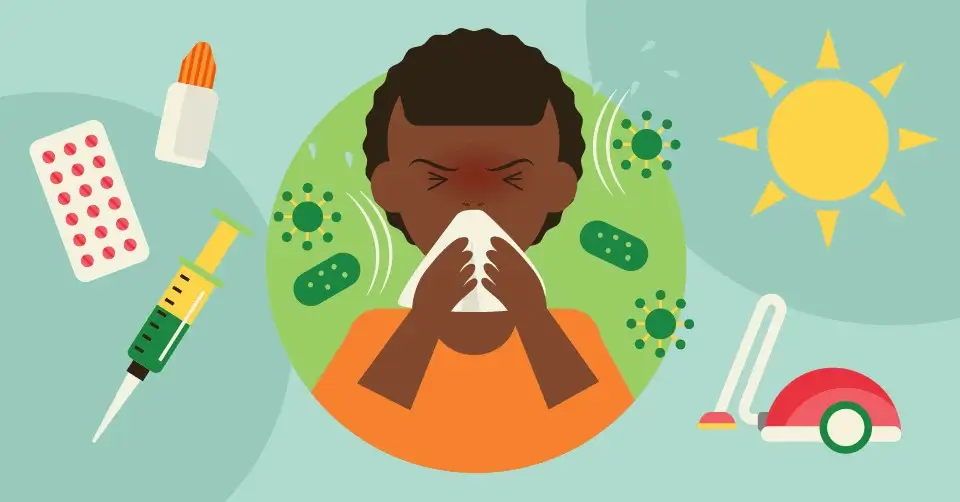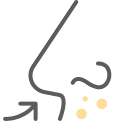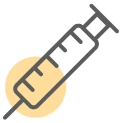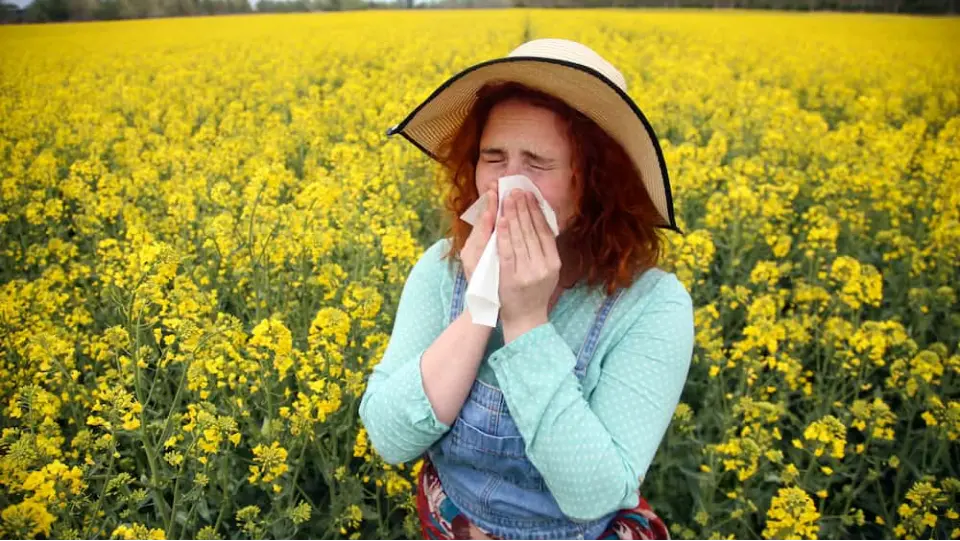How to Relieve Sneezing From Allergies
By Kristen Seymour
If phrases like, “Bless you!” and, “Gesundheit!” follow you around like woodland creatures padding after Snow White, you may wonder, "Why am I sneezing so much?"
That question has many potential answers. Possible causes of sneezing include allergies, cold and influenza viruses, strong odors, dry air, dust, and chemical and physical irritants (for instance, when you smell black pepper or glance at the sun and feel a tell-tale tickle).1
But let’s focus on allergies, one of the most common causes of sneezing. The good news is you can treat the symptoms of allergies such as sneezing fits. Keep reading to discover whether allergies are causing you to sneeze and learn how to stop sneezing from allergies.

Facts About Sneezing
Sneezing is a protective reflex response9
Sneezing is common to all humans and widespread in the animal kingdom.9
Sternutation is the medical word for sneezing.
Each sneeze can produce up to 40,000 droplets.10
Causes of Sneezing From Allergies
If you want to determine what’s causing your sneezing fits, it’s important to identify the allergic triggers you’ve contacted. The best way to avoid sneezing from allergies is to avoid exposure to allergens. If you know you sneeze when you’re around a particular plant or during certain times of the year when pollen is high, you can minimize your exposure.4
Some of the most common allergy triggers that cause sneezing include4,12:

Bugs and Insects
Sometimes, you can't avoid things that make you sneeze. If you must stop a sneeze, try breathing through your mouth and pinching your nose. You can also take steps to prevent sneezing. To do this, it's helpful to understand why things like pollen, pet dander, mold, or dust cause sneezing.
Why Do We Sneeze From Allergies?
Achoo! We’re all familiar with sneezing, but have you wondered why do we sneeze? These five steps will help you understand what happens in your body when you sneeze.
First, an allergen enters your body. Seasonal allergens include pollen, which is released into the air by trees, grasses, and weeds during pollination.11 (Learn more about what’s making you sneeze by checking our month-to-month pollen guide.)
Once you breathe the allergen, your immune system detects it and begins to attack it like it would a virus or harmful invader, even though the allergen in question is generally harmless.12
As part of the attack, your immune system reacts by releasing a chemical called histamine.13
The physical reactions you identify with allergies, such as nasal passages swelling up and your nose and throat getting itchy and sneezing are your body’s reactions to histamine.
When you sneeze, your body is trying to expel the allergen. Your brain tells the muscles in your chest to contract, your eyes and soft palate close, and next thing you know, you have your face in the crook of your elbow, and you hope there’s a box of tissues within reach.
What Happens When You Sneeze
Sneezing is your body's clever way of removing irritants from your nose or throat. It happens in two main stages9:

1. The Trigger Stage:
This starts when something like dust, pollen, or smoke irritates the inside of your nose. Your nose has a special lining that senses these irritants. When this lining gets disturbed, it sends signals through the trigeminal nerve—a major nerve in your face that handles sensations like touch and pain—to your brain.

2. The Sneeze Response:
Once your brain gets these signals, it tells your body to get ready to sneeze. You'll automatically close your eyes (which is a reflex to protect them), take a deep breath in, and then the muscles in your chest and throat tighten. This builds up pressure. Suddenly, the muscles quickly relax, your throat opens, and air whooshes out of your lungs at high speed, carrying the irritants with it. This blast of air can travel super fast—up to nearly the speed of sound!
The whole process is a powerful and efficient way to clear your airways, making you feel more comfortable. It's one of your body's natural defense mechanisms to help keep you healthy.
Could It Be a Cold?
If you're questioning whether those sneezes are a result of an allergy trigger, it's natural to ponder, "Why do I keep sneezing? Is it allergies or a cold?" Take our allergies versus cold quiz to find out which one you may have. One clue is the duration of the symptoms. A cold typically lasts less than 14 days, but allergy symptoms can persist for as long as you’re exposed to the trigger, which could be a short amount of time or could stretch into weeks or months.5
6 Tips to Stop Sneezing From Allergies
Once you’ve determined that you’re suffering from allergies rather than a cold, you’re ready to figure out how to reduce or relieve sneezing. Here are a few actions you can take: 6
Follow These Tips to Stop Sneezing

1. Remove the Trigger
Identify what’s triggering your allergy. Some common allergy triggers include pollen, pet dander, mold, and dust mites. If possible, remove or avoid the trigger.

2. Reduce your exposure
If you can’t avoid the allergy trigger, reduce your exposure to it. For instance, for outdoor allergies, stay indoors during high pollen counts, remove your shoes when you come inside, and shower and wash your hair before bed. Check out How to Avoid Outdoor Allergies for even more tips.

3. Try a HEPA filter for Indoor Allergies
Reduce your exposure to indoor allergens by cleaning with a vacuum cleaner with a high-efficiency particulate air (HEPA) filter, keeping indoor humidity low, and installing an air purifier with a HEPA filter. Visit our pages 7 Ways to Improve Indoor Air Quality to learn other ways to help reduce allergens in your house.

4. Rinse Sinuses Daily
Rinse your sinuses daily with a sterile saline solution to relieve nasal congestion.It can help reduce sneezing by clearing out mucus throughout your nasal passages — along with the allergens caught in it.7

5. Try Allergy Medication
Take an oral antihistamine, decongestant, or medicated nasal spray to control your symptoms. You can learn more about types of allergy medicine and use our allergy medicine comparison chart to find the right allergy medicine to help relieve sneezing from your allergies.

6. Consider Immunotherapy
Talk to your doctor about the pros and cons of getting immunotherapy (sometimes called allergy shots) to reduce your body’s reaction to allergens.
Conclusion
Sneezing because of allergies can be a real bother, but the more you understand about what's setting off your sneezes, the better equipped you are to manage them. Once you've pinpointed your triggers, you can work on avoiding them and use treatments like allergy medicine to keep your sneezes at bay. And hey, remember, sneezing is your body's way of protecting itself. With the right game plan, you can keep those sneezes from getting in the way of your day-to-day life.

Kristen Seymour brought her passion for both pets and writing to the online space nearly a decade ago, working as an editor at AOL’s Paw Nation and then Vetstreet.com. She’s also a regular contributor to HealthyPet Magazine. Additionally, Seymour covers fitness, food and healthy (and yes, sometimes pets!) on her Fit Bottomed Girls website and podcast. Based in sunny Sarasota, Florida, Seymour shares her office with her husband and a small menagerie of rescue pets: a snuggly senior Lab mix, a mouthy hound mix and a cat who loves to be petted exactly seven times—but never eight.
References
- https://medlineplus.gov/ency/article/003060.htm
- https://www.cdc.gov/nchs/fastats/allergies.htm
- https://www.aafa.org/allergy-facts/
- https://acaai.org/allergies/symptoms/runny-nose-stuffy-nose-sneezing/
- https://community.aafa.org/blog/sneezing-and-sniffling-how-to-tell-if-its-allergies-or-a-cold-and-warning-for-people-with-asthma
- https://acaai.org/news/facts-statistics/allergies
- https://www.mayoclinic.org/diseases-conditions/hay-fever/in-depth/seasonal-allergies/art-20048343
- https://www.ncbi.nlm.nih.gov/books/NBK279487/#:~:text=If%20you%20have%20hay%20fever,That%20can%20relieve%20symptoms
- Songu M, Cingi C. Sneeze reflex: facts and fiction. Ther Adv Respir Dis. 2009 Jun;3(3):131-41. doi: 10.1177/1753465809340571. Epub 2009 Jul 17. PMID: 19617285., https://pubmed.ncbi.nlm.nih.gov/19617285/
- Dhand R, Li J. Coughs and Sneezes: Their Role in Transmission of Respiratory Viral Infections, Including SARS-CoV-2. Am J Respir Crit Care Med. 2020 Sep 1;202(5):651-659. doi: 10.1164/rccm.202004-1263PP. PMID: 32543913; PMCID: PMC7462404.,
- https://acaai.org/allergies/allergic-conditions/seasonal-allergies/
- https://www.niehs.nih.gov/health/topics/agents/allergens
- https://www.health.harvard.edu/a_to_z/allergy-overview-a-to-z
Links to other parties’ articles and websites are provided for convenience only. Kenvue is not responsible for their content.
Related Products
Discover More About ZYRTEC®

Understanding Allergies
Itchy, Runny Nose from Allergies: Causes, Symptoms and Relief
An itchy nose can be really irritating, especially when it leads to a runny nose and sneezing at inconvenient times. Whether you’re in the office, relaxing at home or driving somewhere, it’s never ideal to have a stuffy nose or runny nose. But what causes these symptoms? Read on to learn more.

Understanding Allergies
Can Allergies Cause Sinus Infections?
Learn how allergies can lead to sinus infections & find prevention tips. Discover the causes & symptoms of allergies vs sinus infections & find effective treatment options.

Understanding Allergies
What Are Antihistamines and How Do They Work?
Learn all about antihistamines, including what they are, how they work, what they treat & more. Plus, find answers to frequently asked questions about antihistamines.



